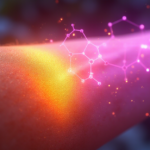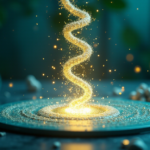Though so important to our waking life, sleep is that evening trip into another realm. But have you ever considered what molecularly happens when you wander off to dreamland? Until I learned the amazing chemistry underlying it, sleep felt to me for years as a mystery, almost mystical process. This essay will transport you into the chemical terrain of sleep and investigate how important neurotransmitters such melatonin, serotonin, and GABA coordinate our sleep cycles. We will learn how these chemical messengers interact to cause drowsiness, control sleep phases, and perhaps affect the quality of our rest. From the science of sleeplessness to the chemistry of dreams, we will decipher the intricate chemical processes controlling our nocturnal sleep. The complex chemical symphony that performs every night will astound you and help you to see sleep from a passive condition to an active, chemically motivated process. It’s time to investigate the intriguing chemistry underlying those priceless hours of relaxation and renewal.
Table of Contents
- The Sleep Molecule: Melatonin’s Crucial Role in Circadian Rhythm
- Serotonin and Sleep: The Mood-Sleep Connection Explained
- Stages of Sleep: A Chemical Journey Through the Night
- When Chemistry Goes Wrong: Understanding Sleep Disorders
- Boosting Your Sleep Chemistry Naturally: Lifestyle and Dietary Approaches
- Extra’s:
The Sleep Molecule: Melatonin’s Crucial Role in Circadian Rhythm
Every night you close your eyes and start to drift off into sleep; have you ever stopped to consider what really happens? Sleep is a very complicated and vital biological process closely related to the amazing chemistry of sleep; it is far more than merely turning off for the day. Sleep felt for many years like one of the great secrets of life, a nightly automatic process we only knew about without much knowledge. But as sleep science has developed, we have started to discover an amazing universe of molecular interactions arranging our nighttime rest. Often called the sleep molecule, melatonin is one of the most important participants in this nightly symphony. But melatonin is a vital message controlling our circadian rhythm, which is essentially your body’s internal 24-hour clock, not only a basic on/off switch for sleep. This clock controls a great spectrum of physiological functions, including maybe most importantly your sleep-wake cycle. To grasp the chemistry of sleep and how our bodies naturally prepare for and preserve peaceful nights, one first must comprehend the function of melatonin. Consider “melatonin as a signal of darkness; its production starts to rise as daylight fades, reaching its peak in the night, so telling your body when it’s time to relax and get ready for sleep.” Sleep is a chemically driven activity because of this complex molecular dance; so, when we value this chemistry of sleep, it helps us to move toward better sleep hygiene and general well-being. Constant revelation of more about these processes by the neuroscience of sleep shows us just how delicate the equilibrium is for good sleep patterns. Have you ever flown across time zones and felt absolutely out of sync? Your circadian rhythm is clearly interrupted in that bewildered state, and melatonin acts as catch-up to restore your internal clock!
When we probe even further into the “chemical processes behind sleep,” we find that melatonin does not act alone; it interacts with other vital neurotransmitters including serotonin and GABA to carefully control the whole sleep cycle. Although melatonin mostly signals darkness and encourages that sleepy feeling, which prepares the scene for sleep, serotonin has its own crucial function in mood control and also helps produce melatonin itself. Conversely, GABA is a neurotransmitter that functions as a natural calming agent, so lowering nervous system activity and assisting in relaxing – all of which are vital for both falling asleep and remaining asleep through the night. From light sleep to deep sleep and REM sleep, each stage of sleep is vitally vital for our physical and mental recovery; these chemical messengers combine in such a sophisticated and intriguing manner to produce these stages. Unbalance in this delicate chemical equilibrium can sadly result in several sleep disorders, including insomnia, in which the body struggles to start or sustain sleep efficiently. Imagine those evenings when you have been staring at screens late into the evening; the blue light released actually reduces melatonin generation, therefore upsetting your circadian rhythm. Furthermore interfering with melatonin levels and upsetting this normal cycle are irregular sleep patterns and periods of great stress, which causes aggravating sleep problems. But knowing the molecular mechanisms of sleep and the critical function of melatonin helps us to make wise decisions to assist our own sleep patterns. For instance, keeping a regular sleep pattern and making sure our bedroom is dark and quiet helps us to maintain our circadian rhythm and lets melatonin perform as it should. Investigating the chemistry of sleep not only helps us to demystify our nighttime rest and general health but also emphasizes the great influence our day activities have on our sleep.
Serotonin and Sleep: The Mood-Sleep Connection Explained
Have you ever observed how closely your sleep and mood seem to entwine eachother? It is not only a coincidence; there is a strong chemistry of sleep involved, and serotonin is central in this link. Fascinated by sleep science, I have discovered that serotonin is actually a vital part in the intricate process of controlling our sleep cycles, not only a neurotransmitter connected with happiness. You might be shocked to learn that serotonin is essential, if indirectly, in enabling us to go asleep every night into dreamland. Although melatonin usually takes front stage as the sleep molecule, serotonin functions as a precursor, opening the path for melatonin synthesis and so affects our Circadian rhythm. Anyone trying to increase their sleep hygiene and general well-being has to understand this mood-sleep connection. Consider serotonin as the preamble for a peaceful night’s sleep; it helps to create well-being and tranquility that would facilitate easy falling asleep. A balanced serotonin level helps our sleep cycle to run smoothly, thereby enabling us to pass through the several phases of sleep with efficiency and wake up feeling rested. This complex link emphasizes how closely our brain chemistry is entwined and how much our emotional state can affect our capacity for quality sleeping. The neuroscience of sleep keeps finding these amazing facts that highlight the delicate balance needed for both peaceful evenings and steady moods.
Examining the “chemical processes behind sleep” further reveals that serotonin does not immediately cause tiredness like melatonin or GABA would do. Its main function in sleep, then, is that of melatonin conversion. Synthesized from tryptophan, an amino acid, serotonin is involved in many brain processes including mood control, appetite, digestion, and sleep as well as other functions. Fascinatingly, serotonin levels usually rise during the day and naturally drop in the evening, which then stimulates the pineal gland to produce melatonin. The real signal of darkness, this melatonin tells our body it’s time to sleep and coordinates our circadian rhythm. Thus, the body needs adequate serotonin if it is to generate enough melatonin to start and sustain sleep successfully. Low levels of serotonin can affect not only mood but also the sleep cycle, hence causing sleep disorders like insomnia as well as possible anxiety or despair. Think of it as follows: serotonin supplies the building blocks for the sleep signal; if there is inadequate raw material, the signal may be weak or erratic. Stress, a bad diet, and lack of sunlight are among the elements that can influence serotonin levels, which therefore can disrupt our sleep pattern. Understanding this chemistry of sleep and the indirect but essential influence of serotonin helps us to value the need of keeping a good lifestyle to support our mood and our sleep. Improving our sleep hygiene and making sure we get enough sunlight during the day can help us produce more serotonin and guarantee greater quality of sleep.
Stages of Sleep: A Chemical Journey Through the Night
Every night you close your eyes and start your nightly sleep; have you ever wondered what really happens? This is a trip through several phases of sleep, each directed by an amazing symphony of chemical events, a real chemistry of sleep in action. I used to see sleep as a passive condition, just drifting asleep and waking up years ago. But exploring sleep science unveiled a complex world of chemical connections controlling human slumber, which makes sleep a dynamic and necessary component of life. Using a chemical perspective helps us to not only demystify what occurs every night but also emphasizes how we may maximize our sleep hygiene for improved health. Consider your night’s sleep as a well-coordinated ballet moving over several phases, each with a different chemical signature and goal. Every stage—from the first lethargy as melatonin levels increase, telling your circadian cycle to slow down, to the deepest restorative sleep and the vivid landscapes of REM sleep—is crucial for physical and mental renewal. This nightly shift through sleep stages is about a complex interaction of neurotransmitters optimizing your brain and body for the next day, not only about slumber. Investigating these chemical pathways of sleep is like discovering a secret universe inside of us where chemistry controls the nature of our slumber and finally our waking life. Realizing that the chemical processes underlying sleep drive this whole process—from easing into light sleep to dream experience—makes every night a different chemical trip.
We ride through several phases of sleep as we go over the night, each distinguished by distinct brain wave patterns and under control via particular neurotransmitters. Usually starting non-REM sleep, the sleep cycle is broken down into phases 1, 2, and 3 (occasionally 4 is also included with stage 3 as slow-wave sleep). Stage 1 is a light sleep, a phase of transition whereby you might still be readily awakened. I recall a day when I was especially anxious about a presentation; even in stage 1, the smallest sound would jolt me awake, underscoring just how readily this first phase may be disrupted. Enter stage 2; sleep deepens and your brain waves slow down even if bursts of fast activity known as sleep spindles still occur. Often referred to as slow-wave sleep, stage 3 is the deepest phase of non-REM sleep and is absolutely essential for physical recovery and waking sensation rejuvenation. These non-REM phases are when GABA and other neurotransmitters help to relax the nervous system and thus deepen our sleep. Then comes REM sleep, sometimes known as Rapid Eye Movement sleep, a stage marked by elevated brain activity akin to that of waking and vivid dreaming. While melatonin and serotonin are essential for starting and preserving sleep, other molecules are involved in REM sleep and help to explain the special experiences of this period. Disturbances in this well calibrated sleep cycle can cause several sleep disorders including insomnia, which affects our capacity to move through these vital phases. I once met someone who suffered with chronic insomnia; understanding the neurochemical processes of sleep and making changes to their sleep hygiene, like cutting evening screen time and guaranteeing a dark, quiet bedroom, made a big difference in their ability to achieve more restorative sleep. Knowing the chemical base of sleep in every stage helps us to value how delicate this process is and how elements like stress, light exposure, and lifestyle choices could affect our nightly chemical trip across the stages of sleep. Respecting our circadian clock and improving our sleep hygiene can help us to support this natural and essential chemical process, thereby guaranteeing that we get the maximum advantages of every stage of sleep for our general health.
When Chemistry Goes Wrong: Understanding Sleep Disorders
Have you ever had those annoying evenings when, regardless of tiredness, sleep seems like a far-off dream? These evenings serve as a sobering reminder of how precisely balanced the chemistry of sleep is and what results when this complex mechanism malfunctions and causes different sleep disorders. Deeply fascinated in sleep science, I have come to see that sleep is a highly active and complicated process controlled by a symphony of neurotransmitters and exactly timed sleep cycles, not only a passive shutting down of our body. When the chemistry of sleep is in harmony, we slink easily into peaceful sleep, cycle through the required sleep stages, and wake up feeling refreshed. But when this delicate equilibrium is upset—by internal or outside events—we may experience a spectrum of sleep disorders that seriously affect our health and well-being. Demystifying these illnesses and discovering practical means to restore our natural sleep cycle depends on an awareness of the neuroscience of sleep and the molecular mechanisms of sleep. Consider your brain as a complex chemical factory at night, meticulously manufacturing and controlling molecules such as melatonin, serotonin, and GABA to lead you through the night. Even minor dysfunction of this factory might show up as problems falling asleep, remaining asleep, or non-restoring sleep—all hallmarks of several sleep disorders. Investigating the chemistry of sleep gone awry is about empowering ourselves to take proactive steps toward better sleep hygiene and general health, not only about detecting problems.
Insomnia is one of the most common sleep disorders and can be generally defined as either non-restoring sleep despite enough opportunity for rest or as continuous difficulties falling asleep or staying asleep. From a chemistry of sleep standpoint, insomnia can usually be connected to imbalances in important neurotransmitter. For example, inadequate production or disrupted signaling of melatonin, the sleep molecule vital for controlling our circadian rhythm, can throw off our body’s natural sleep-wake cycle and make it difficult to start sleep at the proper moment. Likewise, low levels of serotonin, which not only affects mood but also acts as a precursor for melatonin, might indirectly cause insomnia by thereby impairing the synthesis of the main sleep signal. Moreover, disturbances in GABA, the soothing neurotransmitter that helps one relax and lowers nervous system activity, might cause a busy mind at night and make it challenging to quiet racing ideas and drift off to sleep. Many things might set off these chemical imbalances, from chronic stress and anxiety to irregular sleep patterns and inadequate sleep hygiene habits. Think about the effects of late-night screen exposure; the blue light emitted from electronic devices suppresses melatonin generation, thereby directly altering the chemistry of sleep and maybe causing insomnia. Even lifestyle decisions including alcohol and caffeine intake can throw off neurotransmitter balance and affect the sleep cycle. Examining the “molecular mechanisms of sleep disorders” helps us to understand the great influence of our daily activities on our nightly rest and the need of implementing good sleep hygiene practices to assist the delicate chemistry of sleep and either prevent or control disorders like insomnia.
Boosting Your Sleep Chemistry Naturally: Lifestyle and Dietary Approaches
Counting sheep every night is becoming old; you want a good night’s sleep. You would be surprised to learn how much your daily activities affect your sleeping quality! Sleep science helps us realize our chemistry of sleep is not fixed. Changing our daily activities and diet will help us to really improve things. It’s all about knowing how our bodies operate and implementing little adjustments to naturally enhance our sleep. Many of us find that sleep seems like something we do at the end of the day, right? However, as our knowledge of the neuroscience of sleep grows, we find that our brains are indeed rather busy at this period! Many substances known as neurotransmitters and sleep cycles are active and respond to our behavior as well as the surroundings. Enhancing your chemistry of sleep is not about looking for a short fix with drugs or anything else. It’s about developing decent habits that enable your body to sleep as it should. Consider it as maintaining your own sleep system and providing it with the necessary components to provide you peaceful night sleep. Focusing on natural means will enable our body’s natural sleep clock, known as circadian rhythm, to synchronize. This enables us to produce more of the sleep-promoting substances including serotonin and melatonin. This facilitates better falling asleep and deeper sleeping. Improving your sleep is basically about seeing everything you do—from eating well to getting sunlight during the day. All of it affects your chemistry of sleep.
Following proper sleep hygiene is one of the finest natural strategies to improve your chemistry of sleep. Sleep hygiene is what? It’s essentially configuring your bedroom and your routines to facilitate falling asleep and staying asleep. See your bedroom as your sleep zone; it should be cold, dark, and quiet. This signals your body it’s time to unwind and get ready for sleep. Consider how often you check your phone right before bed; the blue light from displays can prevent your body from producing melatonin. A neurotransmitter, melatonin signals your brain it’s dark and time for sleep. Also quite beneficial is a consistent sleeping schedule, even on weekends. It improves your sleep cycle and functions like tuning your body’s internal clock. Your body and mind will relax if you engage in light stretching, meditation, or just deep breathing before bed. Relaxation is quite important since stress can seriously disrupt your sleep chemistry. Furthermore, including some daily exercise—especially in the morning sun—helps your circadian rhythm and enhances your sleep. Try not to engage in especially rigorous workouts right before bed, though. These easy adjustments will enable your body’s natural sleep mechanism to function as it should. This results in a balanced chemistry of sleep that will help you get good night sleep and daytime vitality. The best aspect is also You’re doing it naturally, and this might even help stop insomnia and other sleep disorders. Without any synthetic assistance, these simple yet effective improvements will greatly increase your body’s capacity for deep, revitalizing sleep.
You might also find that your sleep suffers depending on what you consume. Indeed, your chemistry of sleep is much influenced by your diet. Some meals naturally assist your body to create neurotransmitters like melatonin and serotonin, which induce sleep. Foods high in tryptophans, for instance, are fantastic for sleep. Your body converts tryptophan into serotonin first then melatonin. Warm milk includes tryptophan, hence you might have heard that it helps you sleep. Turkey, chicken, almonds, and seeds also have tryptophan and would be wonderful evening dinner fare. Eating complex carbohydrates such as whole grains and vegetables will also help maintain your blood sugar constant, which will prevent you from waking up in the middle of the night since your blood sugar plummeted. Calming foods with magnesium are dark chocolate, almonds, and leafy greens as well as others. Their ability to assist your muscles and nerves relax will enable greater sleep. Conversely, especially before bed, it’s wise to cut back on items like alcohol and caffeine. They could distort your natural chemistry of sleep and sleep cycle. Moreover crucial is keeping hydrated during the day. In fact, dehydration can sometimes cause nighttime waking. Selecting foods fit for sleep will help your body to enhance its chemistry of sleep. This naturally results in more balanced, peaceful sleep and less likely insomnia or other sleep disorders. Thanks to your incredible chemistry of sleep, eating well for sleep is a simple yet powerful approach to enhance your overnight rest and wake up feeling terrific.
Extra’s:
“If you’re fascinated by the chemical processes behind sleep, you might also find it interesting how chemistry shapes other aspects of our daily experiences. For instance, in our article “Beyond Sweet & Sour: The Mind-Blowing Chemistry of Taste You Didn’t Know“, we explore the complex chemical reactions that create the flavors we perceive, much like the intricate chemistry that governs our sleep cycles. Just as understanding the chemistry of sleep can lead to better rest, exploring the chemistry of taste can enhance our culinary experiences. Furthermore, the reach of chemistry extends even to our wardrobes, as discussed in “Dress Greener: The Revolutionary Chemistry Making Fashion Sustainable“. This article delves into how innovative chemical processes are making the fashion industry more environmentally friendly, a different application of chemistry but equally impactful in our lives, just like the chemistry of sleep is fundamental to our health.”
“To expand your knowledge about sleep and its intricate mechanisms, several external resources offer in-depth information. For a comprehensive overview of sleep patterns, the article “Sleep/Wake Cycles | Johns Hopkins Medicine” provides valuable insights into the cyclical nature of sleep and wakefulness. If you are looking for a more detailed scientific exploration of what happens during sleep, “Physiology, Sleep Stages – StatPearls – NCBI Bookshelf” offers a thorough examination of the different sleep stages and the physiological processes that characterize each stage. These resources can further enrich your understanding of the complex world of sleep, building upon the chemical foundations discussed in this blog post.”












This is fascinating! I’ve always been curious about what’s actually happening in my brain when I sleep. The idea of neurotransmitters like melatonin and serotonin orchestrating everything is mind-blowing. I’ve struggled with insomnia, so understanding the chemistry behind it makes it feel less like a random curse and more like something I can potentially address. Thanks for sharing this, it definitely gives me a new perspective!
Wow, I never really thought about sleep being such an active, chemically driven process! It always felt like a passive shutdown to me. Learning about GABA’s role in all of this is particularly interesting. I wonder if there’s a way to naturally boost GABA levels to improve sleep quality? That’s definitely something I’m going to research further. This post has really opened my eyes to the science behind those precious hours of rest.
As a science teacher, I’m always looking for ways to make complex topics like neurochemistry accessible and relatable. This article is a perfect example of how to do that! Explaining sleep through the lens of neurotransmitters is brilliant and makes it easier to grasp for students. I particularly appreciate the breakdown of how melatonin, serotonin, and GABA work together. I’ll definitely be using this as inspiration for future lessons!
Okay, this is seriously cool! The concept of a ‘chemical symphony’ happening every night while I sleep is just incredible. I’ve always been a vivid dreamer, and I’m now curious about the specific chemicals involved in creating those dream experiences. Does the post go into what chemicals might cause nightmares, or are those still a mystery? Thanks for writing this! I’m going to share with my friends, they’ll be as intrigued as I am.
This is a fantastic article! I used to just chalk up my good or bad nights to luck or stress, but now I see it’s so much more than that. The connection between specific neurotransmitters and sleep phases is really intriguing. I’ve noticed my sleep quality seems much worse on days when I’m really stressed. I wonder if that’s related to the changes in those neurotransmitters? I’m going to try to be more mindful about the activities that I engage in before bed, considering this information.